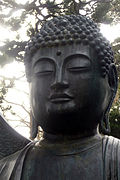Work and teaching
Poromaa and Odland jointly lead Zenbuddhistiska Samfundet from Zengården, Zenbuddhistiska Samfundet's training temple in Fellingsbro in rural Sweden. ZBS also has centers in Stockholm, Gothenburg, Lund, Tampere (Finland), Cologne (Germany) and Glasgow (Scotland). [5] Zenbuddhistiska Samfundet has approximately 500 members [8] and is a member organisation in the Swedish Buddhist Community, [9] which he was involved in founding in 1992. [10]
Poromaa offers regular sesshin (meditation retreats) at Zengården, in English. [11] He also gives public talks on Zen and contributes to Swedish public life through participation in panel discussions on current social, philosophical and religious issues.
Although an artist by training, Poromaa has had a lifelong interest in science. His investigations of the possibility of finding common ground between the Buddhist and scientific worldviews led to the publication in 2009 of his book “The Net of Indra – Rebirth in Science and Buddhism”. [12]
This page is based on this
Wikipedia article Text is available under the
CC BY-SA 4.0 license; additional terms may apply.
Images, videos and audio are available under their respective licenses.


